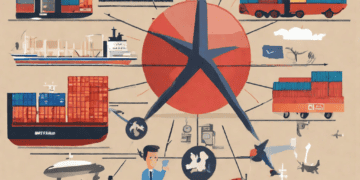In the realm of global commerce, the intricate landscape of imports and exports demands meticulous attention to avoid potential pitfalls in customs clearance and regulatory compliance. Experts emphasize the crucial role of comprehensive understanding and meticulous attention to detail for businesses engaging in cross-border transactions.
Kevin Doucette, director of North American trade policy and compliance at logistics services provider C.H. Robinson in Eden Prairie, Minnesota, underscores the significance of importers and exporters being well-versed in the process and compliance regulations. The responsibility falls on the importer of record or the exporter’s U.S. Principal Party in Interest to ensure accuracy in navigating these complexities.
To streamline this process, industry experts provide insights covering various facets of importing and exporting, ranging from tariff obligations and compliance adherence to cost reduction strategies. Here’s a breakdown of key advice tailored to enhance operational efficiency in international trade:
1. Leveraging Incoterms for Advantageous Transactions
Choosing the right Incoterms plays a pivotal role in defining buyer-seller roles and ownership at specific stages of the transaction. Experts recommend selecting terms that confer ownership at the overseas factory’s door to optimize cost efficiency. This choice can significantly impact duty calculations during customs clearance, potentially reducing expenses.
2. Capitalizing on Tariff Reduction Programs
Exploring trade agreements between countries could yield substantial savings if product origins are thoroughly understood. However, it’s essential to scrutinize the product’s components and their origins, as changes in suppliers or materials can impact tariff eligibility. Leveraging programs like the Craft Beverage Modernization and Tax Reform Act requires proactive engagement to reap benefits.
3. Strategic Routing for Tariff Savings
Smart adjustments in logistics strategies can lead to tariff savings. Direct shipping from certain countries under relevant trade agreements can bypass duties, exemplifying the potential financial gains from strategic routing decisions.
4. Design’s Impact on Tariff Classification
Product design alterations might influence tariff categorization in the Harmonized Tariff Schedule (HTS), thereby affecting duty calculations. Collaborating with experts to design products mindful of favorable HTS classifications can result in reduced tariffs.
5. Formalizing Operations and Expert Oversight
Developing formal programs to manage import/export operations is crucial, complemented by the expertise of a dedicated staff member overseeing compliance. Despite engaging service providers, the onus lies with the company to ensure adherence to regulations.
6. Continuous Learning and Compliance
Staying abreast of regulations by accessing resources provided by government agencies and engaging with local trade organizations fosters ongoing compliance. Conducting due diligence in export transactions is critical to avoid violations, given the stringent regulations imposed by the U.S. government.
7. Understanding Cross-Border Requirements
Comprehending regulations on both ends of the transaction is essential, ensuring adherence to varied rules in different countries concerning transportation, documentation, and import/export partners.
8. Monitoring Changes in Rules and Status
Remaining vigilant about alterations in tariffs, regulations, and customer status is pivotal. Flexibility and adaptability are crucial in navigating shifts such as the U.K.’s departure from the European Union.
9. Collaboration, Integration, and Automation
Integration of import/export guidelines into operational systems coupled with collaborative efforts across departments streamlines trade operations. Automation tools streamline processes, minimizing human errors and enhancing efficiency.
In addition to tariff-related considerations, aspects like foreign exchange management and insurance are integral components of successful global trade. Partnerships and leveraging advantageous currency exchange rates can be advantageous, while comprehensive insurance coverage mitigates potential risks associated with varying legal liabilities across borders.
Understanding and appropriately implementing Incoterms 2020, in particular, play a pivotal role in delineating responsibilities between buyer and seller in international transactions. Proper comprehension and application are essential to prevent transactional impediments or compliance breaches.
When companies grasp the intricacies of global trade regulations, foster internal expertise, and leverage strategic partnerships and technological advancements, they substantially enhance their prospects of efficient and compliant cross-border operations.
Jeff Simpson, Manager of Trade Policy at C.H. Robinson, reinforces the importance of employee education and training to ensure a comprehensive understanding of Incoterms and their applications in fostering successful international trade practices.
Stay on top of supply chain logistics news updates at The Supply Chain Report. Visit ADAMftd.com for free international trade tools.
#GlobalCommerce #CrossBorderTrade #ImportsAndExports #CustomsCompliance #TariffReduction #Incoterms2020 #TradeAgreements #LogisticsStrategy #HTSClassification #ExportOperations #ComplianceManagement #ForeignExchangeManagement #SupplyChainEfficiency #TradePolicy #GlobalTradeExperts #AutomationInTrade #RiskManagement #C.H.Robinson #InternationalTrade #GlobalLogistics #CustomsClearance #ExportCompliance #StrategicRouting #TariffSavings #TradeExpertise #SupplyChainManagement #RegulatoryCompliance #OperationalEfficiency #TradeEducation #TradePolicyExpert















